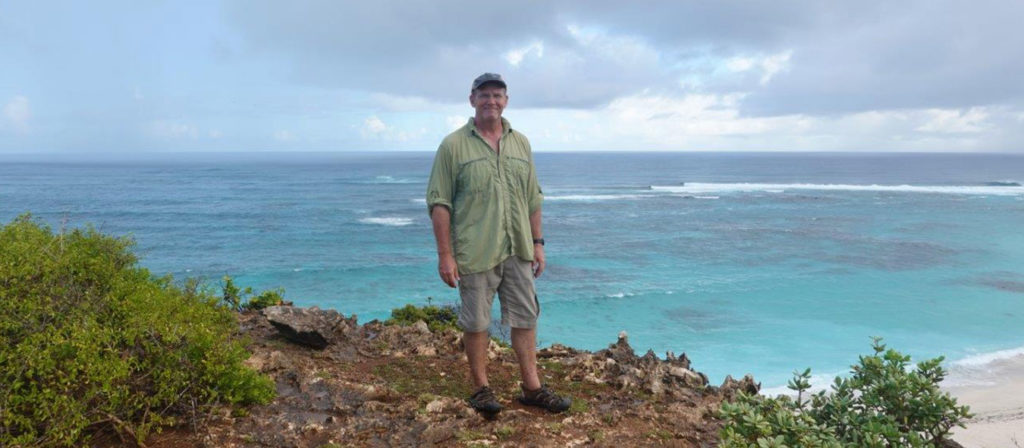Dr. Jason Hubbart, director of the WVU Institute of Water Security and Science (IWSS), scientific lead for the current NSF EPSCoR Track-1 Appalachian Freshwater Initiative (AFI), and professor in the WVU Davis College of Agriculture, Natural Resources and Design, traveled to the Caribbean Island of Barbuda November 14 – 20 to begin an assessment of the islands freshwater resources.
Barbuda is one of the two major islands that make up the Caribbean nation of Antigua and Barbuda. It’s known for its secluded pink and white sand beaches. The island is perhaps more recently known among global communities for Hurricane Irma, which hit Barbuda in early September 2017. The Category-five mega-storm decimated much of the island’s landscape and infrastructure, and the physical damage was widely publicized. A year and a half after Hurricane Irma, there remains much needed work, humanitarian aid, and fiscal resources to rebuild. The humanitarian effort has been somewhat exacerbated by multinational developers and the central government in Antigua who are greatly focused on tourism ventures.
Hubbart met with many of councils, committee members and citizens of the small village of Codrington. Hubbart explored a few of the islands ecological wonders including the large Codrington Lagoon, and the Frigate Bird Sanctuary that is a habitat for huge frigate birds and more than 150 other bird species. Hubbart toured Darby sink hole, two-foot bay and other sites including a massive clearing for a full-sized airstrip developed by the Antigua government immediately after evacuating the Barbuda people from the island directly following Hurricane Irma. Hubbart says that to consider the island an eco-sociological preserve in a contemporary world, is an understatement. Hubbart says the island and its distinct environments – ocean, sea, people, culture, aquatic and terrestrial ecologies – are unique and in jeopardy of exploitation by the outside world. Hubbart feels strongly that Barbuda is at a turning point in its history, and “we have an opportunity to provide assistance to help the Barbuda people more deliberately, intentionally, develop the island in sustainable ways to accommodate tourism and to conserve a way of life and living in a semi-closed system that is in a delicate ecological balance.”
Hubbart’s role in Barbuda stretches well beyond his background as a hydrologist and current role as director of the IWSS. Hubbart’s background and expertise in human anthropology of water stretch well beyond surface water quantity and quality, and well in to the integration of water with social, economic, legal, and political constructs. Hubbart has been asked by the Barbuda council with encouragement of the Antiguan government to provide the first fresh water assessment – quantity and quality – for the island.
“Barbuda is a key example of the kinds of transformative initiatives that West Virginia University is known for, and Barbuda also serves as a metaphor for the kinds of impacts that WVU researchers and educators make in our state and around the world,” Hubbart said. “It is an honor and a privilege to have the trust of the Institution and the trust of the Barbuda and Antigua governments to serve in these very important ambassadorial roles. West Virginia University has a moment, right now, to demonstrate the very good things that we do best for the island of Barbuda, and a moment right now, to shine as global stewards representing our state and its flagship institution”.
Hubbart’s engagement in Barbuda is an example of the kind of intentional capacity building that is encouraged by EPSCoR, and the kinds of transformative projects lead by so many members of the Appalachian Freshwater Initiative, that are expanding interdisciplinary collaborations and communications in all aspects of water resources with great sensitivity to the integration of water and health care for humans, animals and the environment. Hubbart plans to return to Barbuda in spring 2020 for at least 10 days to quantify well recharge rates to help the local municipality and agriculturists to better plan draw-down rates and availability and quantity of fresh water, and run water quality tests on at least 250 private and public wells.
From Jason Hubbart
